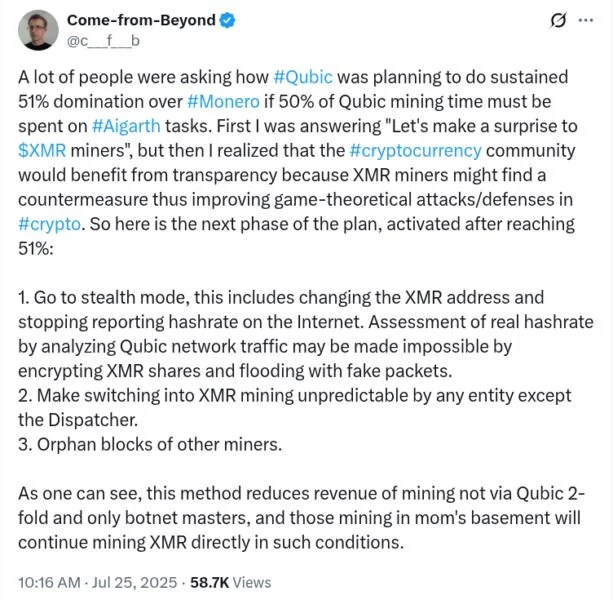Here’s what happened in crypto today

Today in crypto, PayPal is launching a new checkout feature that enables US merchants to accept crypto payments. Meanwhile, privacy token Monero is facing a controversial hashrate takeover attempt by Qubic, a mining pool and crypto network led by Iota co-founder Sergey Ivancheglo. And Roman Storm is seeking an additional $1.5 million to cover rising legal costs in the Tornado Cash case.PayPal launches crypto checkout tool, adds support for over 100 tokensPayments platform PayPal is set to roll out a new feature for US merchants to accept payments with over 100 cryptocurrencies, targeting overseas transactions and more utility of its own stablecoin.According to a Monday announcement, businesses will be able to accept Bitcoin (BTC), Ether (ETH), Solana (SOL), USDt (USDT), USD Coin (USDC) and XRP (XRP), among others. The tool integrates with crypto wallets including Coinbase Wallet, MetaMask, OKX, Kraken, Binance, Phantom, and Exodus.Transactions paid with cryptocurrencies will be automatically converted into PayPal's stablecoin PYUSD or fiat currency at checkout, allowing merchants to receive crypto payments without dealing with price volatility.PayPal will charge merchants a 0.99% transaction fee for crypto payments, which it claims is 90% lower than typical credit card processing costs. For comparison, Visa’s fees start at 1.75% of a transaction cost.The feature aims to simplify cross-border transactions, which PayPal said are often expensive and challenging for small and medium-sized businesses. For now, it is only available to US-based merchants, with the exclusion of New York residents.Monero “economic attack” receives strong community responsePrivacy-focused Monero is facing what appears to be an attempted network takeover by former top mining pool Qubic, prompting community backlash and concerns over hashrate centralization.As of Monday, Qubic had fallen from the top spot on the Monero (XMR) mining pool rankings to seventh, according to MiningPoolStats data. After the community noticed the pool looked to be openly performing a network takeover, the pool’s hashrate plummeted until it fell into its current position as the seventh-largest XMR mining pool.In a June 30 blog post, Qubic revealed that it had begun incentivizing Monero CPU mining via its own network. The mined XMR would then be used to fund buybacks and token burns for the Qubic ecosystem. “QUBIC miners now perform real-world tasks (Monero mining) that generate real market value, which in turn strengthens the QUBIC economy,” the post stated.Sergey Ivancheglo, founder of crypto projects Qubic, NXT and Iota, has admitted that his Qubic network was staging a takeover of the Monero network. In a recent X post, he said that after getting control of most of the network’s hashrate, Qubic would reject the blocks mined by other pools.This would lead to XMR mining becoming only profitable, or even effective, on the Qubic pool. Still, given the pool’s falling hashrate, that danger may be declining.Roman Storm asks for $1.5 million lifeline as Tornado Cash trial presses onRoman Storm, one of the creators behind the Tornado Cash protocol, is seeking another $1.5 million to cover mounting legal costs as his landmark crypto trial enters its third week.In an “urgent call for support,” Storm asked for another $1.5 million, explaining that legal fees have been “piling up fast” as his team continues to “work around the clock.”According to Roman Storm’s website, more than $3.2 million has been raised to support Storm’s Legal Defense Fund — 65% of a new $5 million goal. The Ethereum Foundation also reached its $750,000 goal to assist Storm’s legal defense.Storm’s trial could establish a precedent for criminalizing open-source privacy tools, posing a serious risk to decentralized finance innovation while significantly restricting privacy rights.